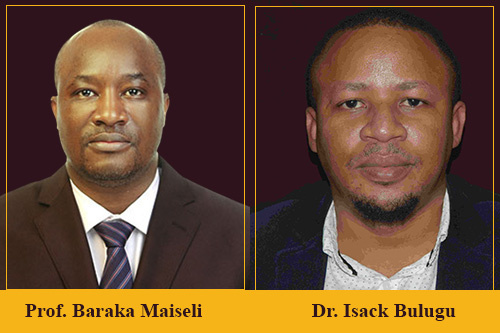Onset of robotics era at UDSM as Prof. Maiseli and Dr. Bulugu join the SPARX programme
By Special Correspondent, CMU
Prof. Baraka Maiseli and Dr. Isack Bulugu from the College of Information and Communication Technologies (CoICT) of the University of Dar es Salaam (UDSM) have been selected for the Support Programme to foster Academic Relationships and eXchange (SPARX), it has been learnt.
The information about the selection of the two UDSM dons in this initiative aiming to bridge the gap between aspiring researchers from developing countries or scholars at risk and experienced mentors in well-established robotics laboratories, was communicated recently by Dr.-Ing. Daniel Leidner, Research Group Leader.
“We are pleased to inform you that, after a thorough review process, you have been matched with a suitable mentor for the SPARX initiative”, said Dr.-Ing. Leidner. The initiative fosters a collaborative environment that promotes learning and growth.
SPARX is under the IEEE Robotics and Automation Society (RAS) whose objectives are scientific, literary and educational in character and strives for the advancement of the theory and practice of robotics and automation engineering and science and of the allied arts and sciences, and for the maintenance of high professional standards among its members.
As mentees, Prof. Maiseli and Dr. Bulugu, each of them will have the opportunity to work closely with one of the distinguished SPARX mentors, receive funding to reimburse collaborative research activities, visits between UDSM and their mentors’ lab, conference participation and other project-related expenses at the faculty level such as travel expenses of their students to the mentors’ lab.
The two UDSM dons, Prof. Maiseli and Dr. Bulugu, both from the Department of Electronics and Telecommunications Engineering (ETE) at CoICT, said they appreciate everyone who made the availability of this great opportunity possible.
“This programme is very important and noble as it leads to so many opportunities and endeavors especially in terms of collaborative research and other scholarly works through mentorship and other useful means and approaches”, said Prof. Maiseli.
Prof. Maiseli’s research interests include deep neural networks, machine vision, image and video processing, robotics, mechatronics and their engineering applications, and embedded electronics; while Dr. Bulugu’s research interests are in the areas of computer vision, human-computer interaction, digital image processing, pattern recognition, and hand gesture/sign language recognition.
Facilitating the exchange of scientific and technological knowledge
The vision of IEEE Robotics and Automation Society (RAS) is to foster the development and facilitate the exchange of scientific and technological knowledge in robotics and automation that benefits members, the profession and humanity. “Our vision is to be the most recognized and respected global organization in robotics and automation.”
According to the information available, RAS strives to advance innovation, education, and fundamental and applied research in robotics and automation. Robotics focuses on systems incorporating sensors and actuators that operate autonomously or semi-autonomously in cooperation with humans.
“Robotics research emphasizes intelligence and adaptability to cope with unstructured environments. Automation research emphasizes efficiency, productivity, quality, and reliability, focusing on systems that operate autonomously, often in structured environments over extended periods, and on the explicit structuring of such environments”, explained the information.
The Society provides aid in promoting close cooperation and exchange of technical information among its members and affiliates, and to this end holds meetings for the presentation of papers and their discussion, sponsors appropriate periodicals and special technical publications, and through its committees’ studies and provides for the needs of its members and affiliates.
Other News
Wed, 08.Jan.2025 : President Mwinyi proclaims UDSM-IMS role in Blue Economy policySun, 05.Jan.2025 : Ministry of Blue Economy, UDSM in key conversations ahead of historic Foundation Stone laying at IMS
Fri, 20.Dec.2024 : ALAF Limited yatoa ufadhili wa masomo ya Umahiri katika Kiswahili kwa wanafunzi wa UDSM
Thu, 19.Dec.2024 : UDSM Herbarium: an invaluable resource fostering conservation, plant taxonomy and ecology
Sat, 14.Dec.2024 : Tracer study findings stress on curriculum to meet national human resource needs
Sat, 14.Dec.2024 : Prof. Mushi calls for ethical and inclusive innovation as Africa higher education leverages AI
Fri, 13.Dec.2024 : UDSM kuwa kituo cha utafiti wa Sayansi ya Bahari barani Afrika
Fri, 13.Dec.2024 : Multi-billion Sida funds to boost research on sustainable development at UDSM


